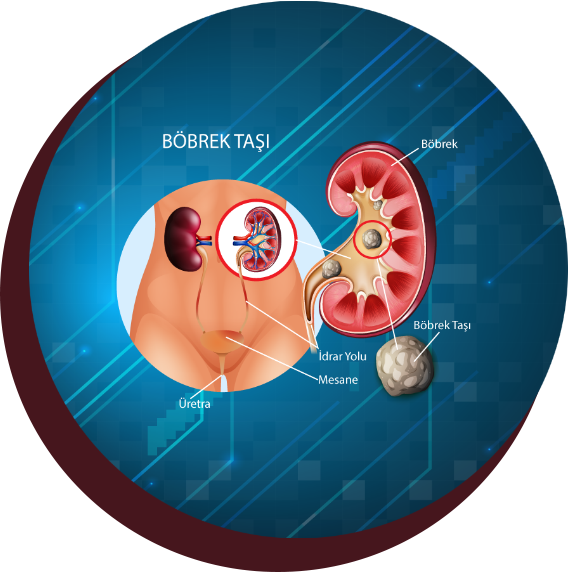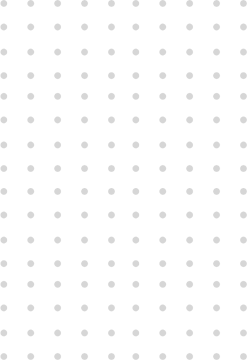Kidney Health and Diseases
Kidney Stones


What is Kidney Stone?
The kidneys, which have a bean-like shape in both parts of the spine, are responsible for removing waste products from the blood. The cleaned blood is then transferred back to the body. Waste products are excreted from the body through the urine. During the purification of the blood, hard deposits consisting of salt and minerals form kidney stones. Kidney stones called nephrolithiasis or renal lithiasis can occur in a single kidney or in both kidneys.
The pain caused by kidney stones is described as even more severe than labor pain. Kidney stones that may occur due to different reasons; It can be treated with different methods according to the size, type and region of the stone. In this article, we will give you detailed information about kidney stones and their symptoms. In the event that kidney stone symptoms are felt, you should directly consult a doctor.

What Are the Symptoms of Kidney Stones?
Kidney stones generally show symptoms when they enter the urinary tract, that is, the ureter. Pain occurs due to the obstruction of kidney stones in the ureter at the time of removal. However, some small kidney stones can be passed through the urine without causing any symptoms.
Severe pain is the first symptom of kidney stone. Pain can occur in the back, kidney area, lower abdomen, under the ribs and in the groin. Frequent urination and pain during urination may be experienced. Pain intensity can vary and can be felt in waves.
Urine odor and color may change.
Vomiting and nausea may occur.
You may urinate more than usual or have a feeling of urinating frequently. Although there is an increase in the number of urination, a decrease in the amount of urine can be observed.
burning sensation while urinating
If the kidney stone has caused an infection, the urine color becomes darker and cloudy. Chills, chills and fever may be seen.
Kidney stones can cause problems during the excretion of urine by blocking the urinary tract, namely the urethra. In people whose urinary tract is blocked by kidney stones, they may lose their kidney functions in the future, and if there are kidney stones on both sides, kidney failure may occur.
Why Do Kidney Stones Occur?
More than one factor plays a role in the formation of kidney stones. The coexistence of more than one factor in kidney stone formation may increase the risk.
Insufficient amount of fluid intake: Lack of sufficient amount of water in the body has a very important effect on the formation of kidney stones. Not drinking enough water during the day increases the density of the substances that are the precursors of stones excreted in the urine. However, it can make the urine acidic. This causes the formation of kidney stones.
Gender: Males have a higher incidence of kidney stones than females.
Genetics: Having kidney stones in the family of the individual leads to the formation of kidney stones genetically.
Patients who have had kidney stones before are more likely to develop kidney stones again. This condition is more common, especially in patients who have had it before the age of 25.
Our diet is another cause of kidney stone formation. High nutritional level in terms of protein, sodium and sugar is one of the factors that cause the emergence of this disease.
The incidence of this disease is increasing in people who have undergone digestive system surgery.
Having a single kidney increases the risk of this disease.
As a result of increased cystine, oxalate, calcium or uric acid ratios in the urine, the probability of kidney stone formation increases.
Drugs used to reduce fluid accumulation also increase the risk of kidney stones.
In people who have had too many urinary tract infections, diseases such as Chron’s disease, hyperparathyroidism, medullary sponge kidney, renal tubular acidosis and dent disease can cause this disease.
Taking vitamin D and calcium pills increases the risk of kidney stones.
How is Kidney Stone Diagnosed?
Urological doctors are very important when diagnosing kidney stones. Kidney stone symptoms and tests performed by the urological doctor can determine this disease. However, some tests are done to determine the kidney stone disease completely.
Blood test
Blood tests are done to check whether the kidneys are working properly. In particular, the rates of substances that may be effective in the formation of kidney stones, such as calcium and uric acid in the blood, are examined.
Urine Test
Thanks to this test, the presence of infection and blood in the urine can be detected. Urine tests can give important details in order to determine the diseases that can accompany kidney stones and to clarify their diagnosis. In addition, 1-day urine collection tests can also be applied. With the urine collection test, substances that can cause or prevent stone formation in the urine can be detected.
Display Methods
Kidney stones can be diagnosed by imaging methods. Different methods can be used to diagnose kidney stones with imaging methods.
Computerized Tomography
The size and location of stones in the urinary tract or kidney, including even small stones, can be determined. The presence of a different disease in the kidney and surrounding organs can be determined by computed tomography.
Ultrasound Method
Ultrasound uses high-frequency sound waves. With this method, detailed information about kidney stones can be obtained. Reliable and fast results can be obtained with ultrasound. Stones that have entered the urinary tract and very small stones can be overlooked in some cases with this method. However, ultrasonography should not be preferred in pregnant women to avoid exposure to radiation.
Kidney Stone Analysis
By taking a stone that has previously been excreted through the urinary tract to the urology doctor, it can be tested with which substances the internal structure of the kidney stone is formed. The stones excreted from the body can be collected by urinating through socks, gauze or a strainer. It gives an idea to the doctor about the application of the treatment that will prevent the formation of stones again by examining the stone in the laboratory environment.
What Should Be Done to Prevent the Formation of Kidney Stones?
The reasons for the formation of kidney stones may differ from each other. In particular, the precautions to be taken according to the diet may vary according to the kidney stone that will form.
Consuming enough water during the day is one of the measures taken to prevent kidney stones. It is necessary to consume more water than the amount of daily urine output. When necessary, the urologist may request the measurement of urine output. People living in dry and hot climates and exercising frequently should consume more water. A clear color of urine indicates that a sufficient amount of water has been consumed.
Depending on the type of kidney stone, a suitable diet can be arranged in consultation with the dietitian and urology doctor. The rules of a balanced diet should not be forgotten when creating a diet.
By reducing the daily salt consumption, it reduces the possibility of kidney stone formation and also reduces the risk of many diseases, especially cardiovascular diseases and hypertension. Various drugs can be used depending on the type of kidney stone.
How should people with kidney stones be fed?
Different diets can be created for patients with a history of kidney stones, depending on the type of kidney stone. It is necessary to determine the diet and form of nutrition in the most accurate way with a dietitian and urology doctor.
It is not a correct approach for patients with calcium oxalate kidney stones to completely cut off calcium. Calcium is essential for healthy bone and tooth structure. For this reason, it should not be restricted unless recommended by the doctor. People who have this type of kidney stone; Spinach, almonds, peanuts, cashews, hazelnuts, wheat bran, asparagus, beet root, strawberry, chocolate, parsley, leek, celery and soy products should be avoided.
The formation of kidney stones can be triggered by the increase in salt consumption. The sodium contained in salt can also be found in many packaged and canned ready-to-eat foods. Restricted consumption of animal protein is important. Obtaining the protein requirement with animal proteins may increase the risk of some types of kidney stone formation.
It is very important to limit the consumption of animal protein such as white and red meat and offal, sea and fish products, eggs, milk and cheese.
When is Surgery Necessary in Kidney Stones?
Surgery may not be necessary for every type of kidney stone. With measures such as drug therapy and increased water treatment, surgery can be brought to the agenda in urinary tract and kidney stones that do not go away.
Kidney stones that cause severe pain and infection
Kidney stones that are too large to pass on their own
Kidney stones that cause bleeding
Kidney stones that can cause kidney damage
Kidney stones that cause complete obstruction must be operated.
In this article, we tried to give a lot of information about kidney stone symptoms and kidney stones. If you are experiencing one of these symptoms or problems, you should definitely consult a specialist doctor. Remember, nothing is more important than your health.
